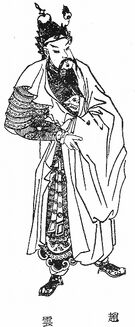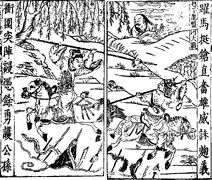Zhao Yun 趙雲 was a general of Liu Bei and played a great part in the establishment of Shu-Han. Zhao Yun's early life is only vaguely described in reliable historical sources so it is hard to give a complete biography of him. The anonymous Zhao Yun biezhuan attributes many heroics to Zhao Yun's name as well. He is the third general commonly associated with the Five Tiger Generals.
Biography[]
Early years[]
Zhao Yun hailed from Zhending county, Changshan commandery.[2] It is claimed in the Zhao Yun biezhuan that Zhao Yun was eight chi tall and possessed a "mighty and magnificent" appearance.[3]
Around 191, Zhao Yun was recommended by the government of Changshan to Gongsun Zan. Zhao Yun was said to already be somewhat prominent, as he lead a group of volunteer soldiers to Gongsun Zan. At the time, Yuan Shao claimed to be Governor of Ji Province, and Gongsun Zan was especially worried the people of Changshan would follow Yuan Shao, so he was pleased when Zhao Yun came to join. Yet he also sneered at Zhao Yun and said, "I heard your noble province's people all desire to join the Yuan clan. Sir, why have you alone changed your mind, being lost but being able to go back?" Zhao Yun replied, "The world is in chaos! It is not known who is right! The people have the peril of being hung down[n 1], so our humble province has discussed who to join, following wherever there be benevolent governance. It is not because we are neglecting Lord Yuan or being biased to you, Enlightened General."[3] Gongsun Zan ordered Liu Bei to assist Tian Kai to fend off Yuan Shao, Zhao Yun followed along as Liu Bei’s main cavalry forces.[2] While together, both Liu Bei and Zhao Yun grew fond of each other's company. However, soon, Zhao Yun's elder brother died, so Zhao Yun requested to leave as to mourn. As Liu Bei saw Zhao Yun off, Zhao Yun exclaimed, "Until my death, I shall never betray virtue!"[3]
Around 200, Liu Bei joined Yuan Shao, reuniting with Zhao Yun at Ye. It is said that their bond only grew closer to where they shared the same bed. Liu Bei sent Zhao Yun to recruit troops, who declared allegiance to Liu Bei.[3] They later left Yuan Shao for the Governor of Jing province; Liu Biao, but Zhao Yun encountered and fought Xiahou Dun at Bowang in 202. Zhao Yun was able to capture Xiahou Dun's subordinate Xiahou Lan.[4] In 208, Liu Biao died, and Cao Cao started to encroach onto the province. Soon, Liu Bei was pursued by Cao Cao's forces, and at Chang Slope, Dangyang, Liu Bei abandoned his wife and children to flee south.[5] It seems that Zhao Yun was also left behind amidst the chaos. When one of Liu Bei's followers suggested that Zhao Yun defected, Liu Bei angrily grabbed a halberd and threw it at the person's direction, yelling, "Zilong would never abandon me just to escape!" Zhao Yun was able to retrieve Liu Bei's young son, Liu Shan, and also protected Lady Gan, the mother of Liu Shan, and brought them to Liu Bei.[5]
Zhao Yun was later appointed as General of the Standard 牙門將軍. While Liu Bei entered the Shu region, Zhao Yun remained in Jingzhou.[6] He was put in charge of guarding Liu Bei's family. While he was away fighting in Shu, Lady Sun wished to return with Liu Shan back to Wu, but Zhao Yun and Zhang Fei stopped her. When Zhuge Liang sent reinforcements to Liu Bei, Zhao Yun's detachment conquered up to Jiangyang and rejoined Zhuge Liang and the others in the siege of Chengdu. Zhao Yun also participated in Liu Bei's Hanzhong campaign during his battle against Cao Cao.
Final years[]
In 221, he opposed Liu Bei's invasion of Wu, stating, "The national traitor is Cao Cao, not Sun Quan! Moreover, if we first destroy Wei, then Wu will naturally serve us. Though Cao himself died, his son, Pi, usurped and stole the throne. We ought to follow the masses' hearts and quickly plan to take Guanzhong and occupy the Yellow and the Wei Rivers and go upstream to suppress cruel traitors. Righteous warriors of Guandong will surely bring supplies and urge their horses as to welcome the kingly sovereign. You should not set aside Wei and first fight with Wu. Once our armies clash, we cannot quickly end it." But he was not listened to and Liu Bei instead had him supervise supplies from Jiangzhou. After Liu Bei's defeat, Zhao Yun had his army go into Yong'an on alert.[7]
In 222, Zhao Yun became Military Protector of the Palace (zhōnghùjūn 中護軍), General Who Subdues the South (zhēngnán jiāngjūn 征南將軍), and was enfeoffed as Marquis of Yongchang district. He later shifted in military post to General Who Maintains the East in Peace (zhèndōng jiāngjūn 鎮東將軍).[8]
In 227, Zhao Yun followed Zhuge Liang to garrison Hanzhong. In 228, Zhuge Liang left to invade Wei through Xiegu road and was matched by Cao Zhen. Zhuge Liang decided that he would attack Mount Qi while Zhao Yun and Deng Zhi would try to block Cao Zhen, even though their numbers were weak. At Jigu, Zhao Yun was defeated by Cao Zhen, but was able to organize the rear and lead an orderly retreat, preventing further casualties.[9] When Zhuge Liang questioned why Ma Su's army was in disarray, yet Zhao Yun's was still together, Deng Zhi said, "Yun himself guarded the rear, ensuring that military supplies and items that none were abandoned, that soldiers and generals had no chance to lose each other."[10] Still, Zhao Yun was demoted to General who Guards the Army.[9] When Zhuge Liang proposed handing out the surplus silk of Zhao Yun's army to the generals, Zhao Yun said, "The military affair was unsuccessful. How can we bestow others? These items ought to all enter the Chian government arsenal. We should wait until the 10th month to grant winter bestowments to them." Zhuge Liang was impressed by Zhao Yun's commitment to his soldiers.[10]
He died in 229.[11] Liu Shan later issued an edict that stated, "Yun previously followed the former Emperor, his merits and accomplishments already outstanding. When I was but a young infant, we trekked through the paths of great difficulty, relying on his loyalty and obedience to escape from peril. Posthumous titles are used to describe ones with foremost merits. There should be an official discussion for Yun to be granted a suitable posthumous title." Jiang Wei led the discussion, where he cited Zhao Yun's generosity, loyalty, and lawfulness, and declared that his acts would be forever remembered.[12] They decided that his posthumous title would be the Obedient and Orderly Marquis.[11][n 2]
Family[]
- Eldest son: Zhao Tong 趙統 - Succeeded as Marquis of Yongchang District, served as Director of Palace Gentleman Rapid as Tigers and xinglingjun (行領軍).[13]
- Second son: Zhao Guang 趙廣 - Served as General at the Ivory Gates. He followed Jiang Wei to Dazhong, where he died in battle.[13]
Notes[]
- ↑ Being in a difficult situation.
- ↑ "To cite the Law of Posthumous Titles, one with gentle virtue and compassionate benevolence can be called the Obedient; performing matters orderly can be called the Orderly; overcoming and stabilizing disaster and chaos can be called the Orderly. Accordingly the posthumous title for Yun was the Obedient and Orderly Marquis."
Fact vs. Fiction[]
Historically…
- …He never fought Cao Cao's army in saving the baby Liu Shan.
- …Zhao Yun was not one of the Five Tiger Generals.
References[]
- ↑ de Crespigny. A Biographical Dictionary of Later Han to the Three Kingdoms, biography of Zhao Yun.
- ↑ 2.0 2.1 趙雲字子龍,常山真定人也。本屬公孫瓚,瓚遣先主為田楷拒袁紹,雲遂隨從,為先主主騎。Chen Shou, "Biography of Zhao Yun" in the Records of the Three Kingdoms
- ↑ 3.0 3.1 3.2 3.3 《雲別傳》曰:雲身長八尺,姿顏雄偉,為本郡所舉,將義從吏兵詣公孫瓚。時袁紹稱冀州牧,瓚深憂州人之從紹也,善雲來附,嘲雲曰:「聞貴州人皆願袁氏,君何獨迴心,迷而能反乎?」雲荅曰:「天下訩訩,未知孰是,民有倒縣之厄,鄙州論議,從仁政所在,不為忽袁公私明將軍也。」遂與瓚征討。時先主亦依託瓚,每接納雲,雲得深自結託。雲以兄喪,辭瓚暫歸,先主知其不反,捉手而別,雲辭曰:「終不背德也。」先主就袁紹,雲見於鄴。先主與雲同床眠卧,密遣雲合募得數百人,皆稱劉左將軍部曲,紹不能知。遂隨先主至荊州。Chen Shou, Pei Songzhi. "Biography of Zhao Yun" in the Annotations to the Records of the Three Kingdoms
- ↑ 《雲別傳》曰:先是,與夏侯惇戰於博望,生獲夏侯蘭。蘭是雲鄉里人,少小相知,雲白先主活之,薦蘭明於法律,以為軍正。雲不用自近,其慎慮類如此。先主入益州,雲領留營司馬。此時先主孫夫人以權妹驕豪,多將吳吏兵,縱橫不法。先主以雲嚴重,必能整齊,特任掌內事。權聞備西征,大遣舟船迎妹,而夫人內欲將後主還吳,雲與張飛勒兵截江,乃得後主還。Chen Shou. "Biography of Zhao Yun" in the Records of the Three Kingdoms, cited by Pei Songzhi.
- ↑ 5.0 5.1 及先主為曹公所追於當陽長阪,棄妻子南走,雲身抱弱子,即後主也,保護甘夫人,即後主母也,皆得免難。遷為牙門將軍。先主入蜀,雲留荊州。Chen Shou, "Biography of Zhao Yun" in the Records of the Three Kingdoms
- ↑ Kongming's Archives, Zhao Yun (Zilong)
- ↑ 《雲別傳》曰:孫權襲荊州,先主大怒,欲討權。雲諫曰:「國賊是曹操,非孫權也,且先滅魏,則吳自服。操身雖斃,子丕篡盜,當因衆心,早圖關中,居河、渭上流以討凶逆,關東義士必裹糧策馬以迎王師。不應置魏,先與吳戰;兵勢一交,不得卒解也。」先主不聽,遂東征,留雲督江州。先主失利於秭歸,雲進兵至永安,吳軍已退。Chen Shou. "Biography of Zhao Yun" in the Records of the Three Kingdoms, cited by Pei Songzhi.
- ↑ 建興元年,為中護軍、征南將軍,封永昌亭侯,遷鎮東將軍。Chen Shou, "Biography of Zhao Yun" in the Records of the Three Kingdoms
- ↑ 9.0 9.1 五年,隨諸葛亮駐漢中。明年,亮出軍,揚聲由斜谷道,曹真遣大衆當之。亮令雲與鄧芝往拒,而身攻祁山。雲、芝兵弱敵彊,失利於箕谷,然歛衆固守,不至大敗。軍退,貶為鎮軍將軍。 Chen Shou, "Biography of Zhao Yun" in the Records of the Three Kingdoms
- ↑ 10.0 10.1 《雲別傳》曰:亮曰:「街亭軍退,兵將不復相錄,箕谷軍退,兵將初不相失,何故?」芝荅曰:「雲身自斷後,軍資什物略無所棄,兵將無緣相失。」雲有軍資餘絹,亮使分賜將士,雲曰:「軍事無利,何為有賜?其物請悉入赤岸府庫,須十月為冬賜。」亮大善之。Chen Shou, Pei Songzhi. "Biography of Zhao Yun" in the Annotations to the Records of the Three Kingdoms
- ↑ 11.0 11.1 七年卒,追謚順平侯。Chen Shou, "Biography of Zhao Yun" in the Records of the Three Kingdoms
- ↑ 《雲別傳》載後主詔曰:「雲昔從先帝,功績旣著。朕以幼沖,涉塗艱難,賴恃忠順,濟於危險。夫謚所以叙元勳也,外議雲宜謚。」大將軍姜維等議,以為雲昔從先帝,勞績旣著,經營天下,遵奉法度,功效可書。當陽之役,義貫金石,忠以衞上,君念其賞,禮以厚下,臣忘其死。死者有知,足以不朽;生者感恩,足以殞身。謹按《謚法》,柔賢慈惠曰順,執事有班曰平,克定禍亂曰平,應謚雲曰順平侯。Chen Shou. "Biography of Zhao Yun" in Records of the Three Kingdoms, cited by Pei Songzhi
- ↑ 13.0 13.1 雲子統嗣,官至虎賁中郎督,行領軍。次子廣,牙門將,隨姜維沓中,臨陣戰死。Chen Shou, "Biography of Zhao Yun" in the Records of the Three Kingdoms
Art gallery[]
Sources[]
- Chen Shou 陳壽 (233–297). Sanguo zhi 三國志 “Records of the Three Kingdoms”, with official commentary compiled by Pei Songzhi 裴松之 (372-451).


